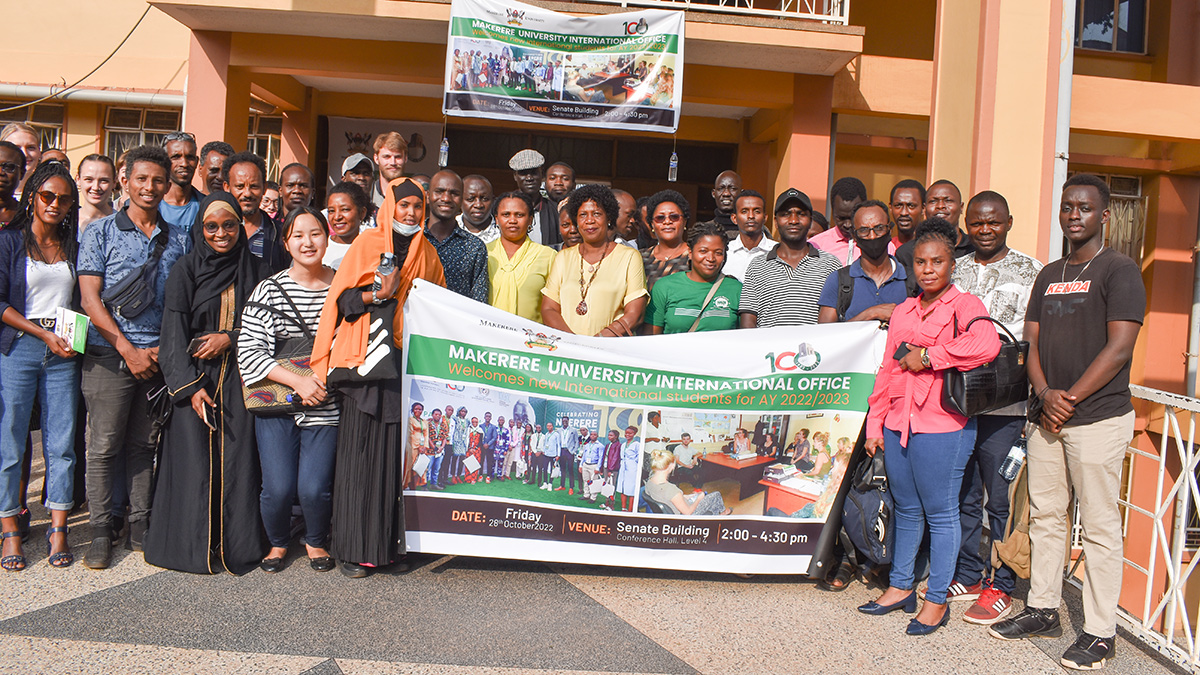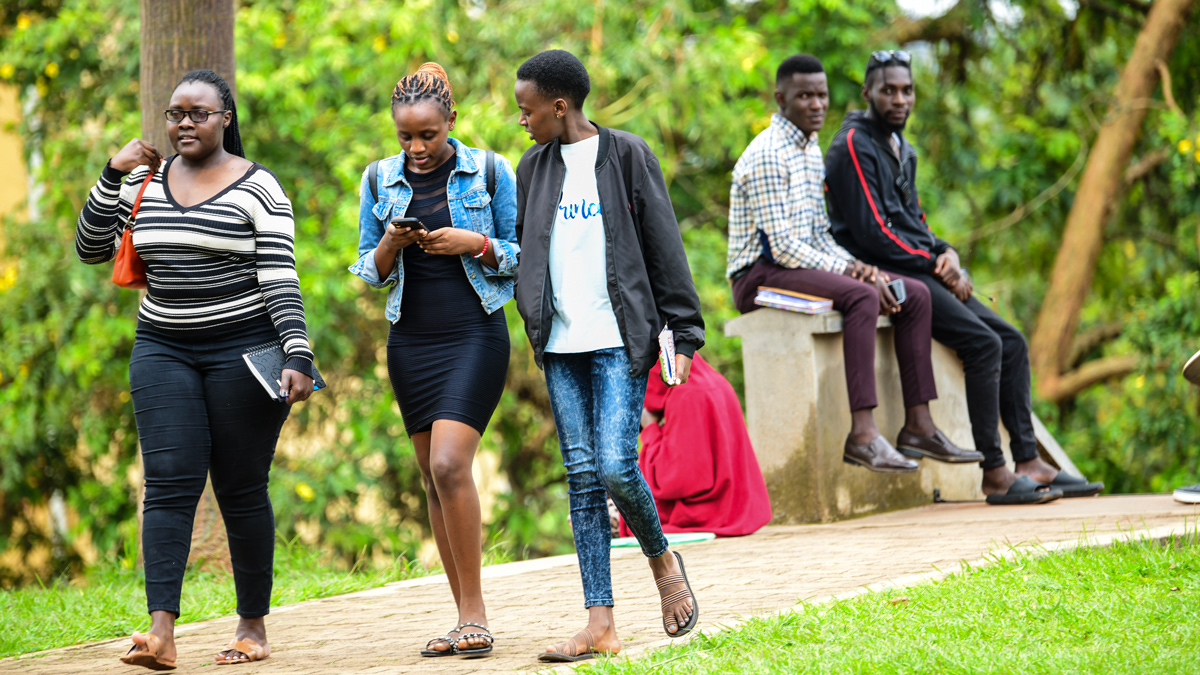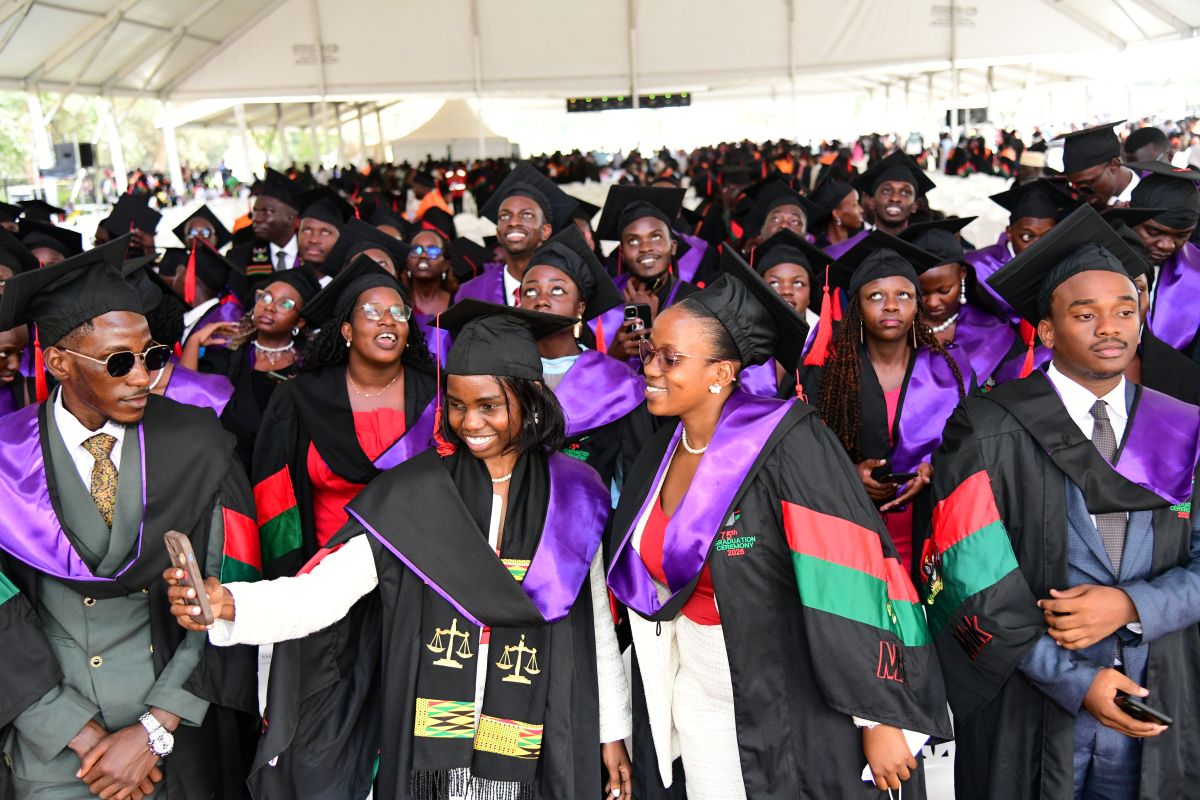On 8th October 2014, a day shy of Uganda’s 52nd Independence anniversary, the Makerere University Main Hall played host to a panel discussion organized by the University Forum on Governance (UNIFOG) in partnership with Konrad-Adenauer-Siftung (KAS). Based on the theme “Awakening the Giants: The Academia and Development Discourse in Uganda” the discussion drew participants mainly from the Humanities and a host of Staff, Students and members of the general public.
Giving the opening remarks, Konrad-Adenauer-Siftung’s Programme Officer for Uganda and South Sudan Ms. Maike Messerschmidt noted that her organisation was particularly excited about the day’s debate considering that it had set to analyse and highlight the role of academia in Uganda’s development.
“The question of the role that the academia plays, or should play in development and even politics is not limited to Uganda. All over the world, the academia is often stuck between two poles of getting caught in the ivory tower and its concepts and theories and connecting closely, and as many might say, too closely to everyday realities, and we therefore want to thank UNIFOG for the great initiative,” said Ms. Messerschmidt.
I n his remarks, UNIFOG’s Executive Secretary Mr. Bruce Kabaasa thanked KAS for the support to this important initiative as well as the panelists for agreeing to discuss the day’s topic, and the students for their huge turn up. He then introduced the day’s panelists: Dr. Simba Kayunga Ssali, Lecturer-Department of Political Science, College of Humanities and Social Sciences (CHUSS); Dr. Asiimwe Godfrey, Head-Department of Philosophy and Development Studies, CHUSS; and Dr. Tanga Odoi, Department of History, CHUSS.
n his remarks, UNIFOG’s Executive Secretary Mr. Bruce Kabaasa thanked KAS for the support to this important initiative as well as the panelists for agreeing to discuss the day’s topic, and the students for their huge turn up. He then introduced the day’s panelists: Dr. Simba Kayunga Ssali, Lecturer-Department of Political Science, College of Humanities and Social Sciences (CHUSS); Dr. Asiimwe Godfrey, Head-Department of Philosophy and Development Studies, CHUSS; and Dr. Tanga Odoi, Department of History, CHUSS.
To break the ice and ensure that everyone was on the same page, Dr. Sarah Ssali, Senior Lecturer-Department of Women and Gender Studies, CHUSS put the day’s topic into perspective by noting that the academia has indeed excelled in all fora of development and governance where they were well facilitated. She also noted that although there was widespread promotion of practical skills, one can never practice what they have not theorized.
“The history of society is the history of production, dissemination and knowledge and the ideas that drive society are incubated and nurtured within the academia. As the academia is a reflection of the larger society, what then comes out depends on how the larger society invests in this kind of academia. The status of society then depends on the value they attach to the academia” observed Dr. Ssali.
 Comparing the post-independence Makerere of the 1960s and the current one, she decried the continual alluding to practices and subjects that help to create the well-rounded graduates as belonging to the ‘old elite club’. “Everything to do with the old elite club is not considered lately. Shakespeare was recommended reading for Medical School in the sixties but all this is no more,” she said.
Comparing the post-independence Makerere of the 1960s and the current one, she decried the continual alluding to practices and subjects that help to create the well-rounded graduates as belonging to the ‘old elite club’. “Everything to do with the old elite club is not considered lately. Shakespeare was recommended reading for Medical School in the sixties but all this is no more,” she said.
Remarking on the Government emphasis of Sciences over Humanities Dr. Ssali pondered “Who is going to shape the agenda in conflict and resolution if we think that humanities are not useful?” She observed that the biggest conflict now lay in thinking. She then urged the all Humanities students to take their courses seriously considering that their “thinking only” nature is helpful in demonstrating that research will have policy impact.
“How prepared are we if we don’t rethink our position as our population grows? As academia, we also stand to be blamed for having conformed rather than challenged regardless of the time. But we need to know that the solutions of today will not solve the problems of tomorrow and we need to do something about it. Ugandan academia needs to shape development discourse so that we nurture the nature of inquiry that produces it” she observed.
She concluded her introduction by posing three key questions; does our academia really need awakening and are we a sleeping giant? Are we to blame for the lack of development in this society and is this a problem of we the individual academics or of the wider context we are located in? Is there more we can do to shape the development discourse of this country; and if there is, what more can we do and how best can we turn the trend around?
 In his contribution, Dr. Simba Kayunga Ssali concurred with the opening remarks that the giant was indeed awake but whether he was a giant at all was topic that would make for interesting discussion. He further noted that although development is still a debate, how to overcome underdevelopment was also still a debate.
In his contribution, Dr. Simba Kayunga Ssali concurred with the opening remarks that the giant was indeed awake but whether he was a giant at all was topic that would make for interesting discussion. He further noted that although development is still a debate, how to overcome underdevelopment was also still a debate.
Dr. Simba then endeavoured to lay out the role that academia has played and continues to play since independence. One of these is knowledge generation as evidenced by the various forms of research findings published annually by Universities such as Makerere. Regarding the role of policy formulation he cited: the Common Man’s Charter (Move to the left) as a work of an academic; the Plan for Modernisation of Agriculture (PMA) blueprint developed by Professor Godfrey Bahigwa; the Local Governments review commission of 1986 led by Professor Mahmood Mamdani; Reorganising Uganda’s foreign policy; The 2004 White Paper Defence Transformation in Uganda; as well as the fact that Uganda’s National Planning Authority (NPA) is headed by a member of the academia Dr. Joseph Muvawala. He also noted that the academia was involved in governance through their professional capacities as Board Members of various Government Parastatal bodies and Companies.
He however also outlined challenges faced by the academia as: dissemination of research, noting that our research does not seem to reach policy makers or even make it to the recommended reading list for course outlines in our own university; the lack of willingness by Government to consume our own Ugandan views; the disastrous semester system which preoccupies staff with marking and teaching with little room left for intellectual debate; and neo-liberalism which has created a cynic standardization and universalisation of discourse. “There are certain things which you are supposed to take as universal. We in the Department of Political Science are supposed to say that liberal democracy is the standard way of going about our politics and there are no alternatives” added Dr. Simba.

Dr. Simba also noted that neo-liberalism has created some forms of powers which shape debates. “For example you cannot conduct a healthy debate on Genetically Modified Organisms (GMOs) without attracting persecution from the powers. And if you tried to say that homosexuality is bad, you are risking not being given a visa to the west. Those controlling the market and those controlling global politics are forcing us to think in a certain direction because of the powers they have over us” he said in conclusion.
 Commenting on the day’s them, Dr. Asiimwe Godfrey noted that this debate was long overdue in Uganda since the academia has not been sleeping but had been actively engaged in research. He however pointed out that this involvement had only been at individual level, with researchers selectively chosen to vindicate the status quo and write the research of the rule. He further noted that development was about humanity and society but there was need to first understand this humanity and society before it can be developed. He observed that this was the basis for the countries of East Africa coming up with research institutions like; The Institutes of Development Studies in Nairobi and Dar es salaam as well as the Makerere Institute of Social Research (MISR) in Uganda.
Commenting on the day’s them, Dr. Asiimwe Godfrey noted that this debate was long overdue in Uganda since the academia has not been sleeping but had been actively engaged in research. He however pointed out that this involvement had only been at individual level, with researchers selectively chosen to vindicate the status quo and write the research of the rule. He further noted that development was about humanity and society but there was need to first understand this humanity and society before it can be developed. He observed that this was the basis for the countries of East Africa coming up with research institutions like; The Institutes of Development Studies in Nairobi and Dar es salaam as well as the Makerere Institute of Social Research (MISR) in Uganda.
He noted that these research institutions fed the policy making process and formed the synergy between the Fifth Estate (Academia) and the Government. He however traced the commencement of “sleeping” to the 1980s which saw a decline in research and analysis in development policy making and the emergence of new actors of neo-liberalism such as Non-Governmental Organisations (NGOs), National Institutes and Think Tanks. These, he said redirected the course of national policy formulation.
“The neo-liberal agenda was to direct development towards its interests of modernization of Africa and marketisation, and I think that was the point of departure. This was meant to accelerate Africa’s development and move it from backwardness to modernity. Accordingly, the State was rolled back and that led to the disconnection with its linkage with policy research and coordination with the Fifth Estate and from then on, university voices in contemporary development had to reform, comply or were marginalized” explained Dr. Asiimwe.
He further noted that this development came with reduction in funding both to operations and research at public universities, which led to a discourse that portrayed Higher Education in Africa as a luxury and unproductive. As a result, the 1980s ushered in the consultancy industry as a quick fix for complex African problems and market failures which led the poorly remunerated Scholars in Makerere looking for lucrative engagements in the marketplace. Dr. Asiimwe further noted that as a result, critical thinking was often referred to as divisive.

“Like most Africans, technocrats are also lazy readers and eventually they are conceptually dependent on parroting from foreign models and equations. And leaders also prefer shortcut policy briefs; saying our reports are so rigorous, laborious and idealistic, and prefer roadside political adhocism for purposes of expediency. African Scholars have also not been left out. While some became reformist, others fitted into this system by looking for greener pastures in these new agencies which leaves the begging question, whose university and whose development agenda?” questioned Dr. Asiimwe. He thereafter concluded that “The Academia; the Fifth Estate must be brought back in. Critical thinking is not subversion and I would like to maintain that it is better than destructive praise.”
 The third and last panelist of the day Dr. Tanga Odoi in his contribution opted to start by saying that the problems of academia and development discourse in Uganda was a problem of leadership. “I don’t want to blame colonialism after all these years, I don’t want to blame the climate, I want to think that leadership is the problem” he said in opening. He further stated that the Government has not helped the Academia but has instead led to a situation where the people that can shout the slogans of the party are more protected than the scholars. Justifying his stand, he observed that the Primary School teacher of 1964 was more respected with regard to pay and societal position than a University Lecturer of today.
The third and last panelist of the day Dr. Tanga Odoi in his contribution opted to start by saying that the problems of academia and development discourse in Uganda was a problem of leadership. “I don’t want to blame colonialism after all these years, I don’t want to blame the climate, I want to think that leadership is the problem” he said in opening. He further stated that the Government has not helped the Academia but has instead led to a situation where the people that can shout the slogans of the party are more protected than the scholars. Justifying his stand, he observed that the Primary School teacher of 1964 was more respected with regard to pay and societal position than a University Lecturer of today.
He pointed out that this situation was further exacerbated by the colonial era which still controls how much support goes towards a particular sector in education, and eventually the number of vibrant people who can challenge the status quo. He therefore noted that each country must have its own objectives in order to develop through initiatives like five-year development plans with universities such as Makerere as the engine.
“The engagement we have with Government today has turned out to be more personal than institutional. Staff contacted in their individual capacities then go away without even the University knowing that S/he is going to spend hours not teaching but consulting on behalf of or for Government. So why don’t we engage the Government at University level so that experts from Economics, Agriculture, Social Science, Humanities come together to critique and come up with ideas that will direct the country in five years?” wondered Dr. Tanga. “That has not happened and until it happens, we shall not definitely be part of what is being done in Government apart from being part of the voters” he stated.
 He noted that by engaging with Government on individual level, the academia was lowering the University to a level of recipient other than participant in the creation and formulation of discourse for the development of this country. He concluded his presentation by noting that “We need to respect that the academia has a place and a guiding role in the country. You cannot develop unless you respect the value of other people. A country that will have been independent for 52years on 9th October 2014 should have National Ministers and not ethnic Ministers.”
He noted that by engaging with Government on individual level, the academia was lowering the University to a level of recipient other than participant in the creation and formulation of discourse for the development of this country. He concluded his presentation by noting that “We need to respect that the academia has a place and a guiding role in the country. You cannot develop unless you respect the value of other people. A country that will have been independent for 52years on 9th October 2014 should have National Ministers and not ethnic Ministers.”
The panel discussion which was moderated by Mr. Charles Mwanguhya Mpagi from the Nation Media Group (NMG) then took the debate to the audience where questions, comments and solutions were all fronted in line with the day’s subject. Throughout this discussion, the moderator challenged the audience not to view the situation from without but consider themselves as part and parcel of the solution space.
In the concluding remarks of the day, the panelists concurred that the giant was indeed awake and that consultants do not provide wrong answers but their input was being drafted in ways and timeframes that do not provide appropriate answers to complex problems. They also noted that our poor reading culture makes us jump on development buzzwords but there was need to critique these buzzwords. The Executive Secretary UNIFOG once again thanked the panelists and audience for participating in the debate and KAS for supporting the public dialogue. “UNIFOG is committed to ensuring that Makerere University and other Higher Education Institutions occupy the position of guiding debate,” added Mr. Kabaasa.
Article by Public Relations Office

 General6 days ago
General6 days ago
 General1 week ago
General1 week ago
 General1 week ago
General1 week ago
 General1 week ago
General1 week ago
 General1 day ago
General1 day ago


